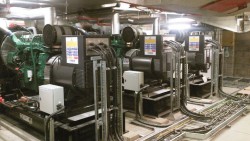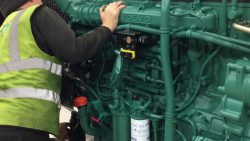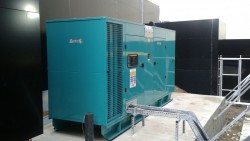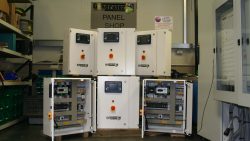The Hidden Dangers of Power Outages
The hidden dangers of power outages are a reality that many of us don't think about until it's too late. We've all been there - sitting in the dark, waiting for the power to come back on, wondering what's going on and when we'll be able to get back to our normal lives. But the truth is, power outages can be a lot more than just a minor inconvenience. They can be deadly, destructive, and devastating to businesses and individuals alike. As "a single power outage can cause millions of dollars in damages and lost productivity," according to a study by the National Electrical Manufacturers Association.
The human cost of power outages is a significant concern. When the power goes out, hospitals and healthcare facilities are often the first to be affected. This can be particularly problematic for patients who rely on life-saving equipment, such as ventilators and dialysis machines. In fact, "power outages are a major cause of patient morbidity and mortality," according to a study published in the Journal of Healthcare Engineering. Moreover, power outages can also lead to accidents and injuries, particularly in the home. For example, when people use candles or generators improperly, they can start fires or cause carbon monoxide poisoning.
The Economic Impact of Power Outages
The economic impact of power outages is also a significant concern. When businesses lose power, they often lose productivity and revenue. This can be particularly devastating for small businesses, which may not have the resources to recover from a prolonged power outage. In fact, "a single power outage can cost a business up to $10,000 per hour," according to a study by the Ponemon Institute. Moreover, power outages can also lead to supply chain disruptions, which can have a ripple effect throughout the entire economy. For example, when a manufacturing plant loses power, it may not be able to produce goods, which can lead to shortages and delays downstream.
The economic impact of power outages is not limited to businesses, however. Individuals can also be affected, particularly those who work from home or rely on the internet for their livelihood. When the power goes out, they may not be able to work, which can lead to lost income and productivity. In fact, "power outages can cost the average worker up to $100 per day," according to a study by the National Federation of Independent Business. Moreover, power outages can also lead to food spoilage and other losses, particularly for those who rely on refrigeration to store perishable goods.

The Importance of Regular Maintenance
So, what can be done to prevent the hidden dangers of power outages? One of the most important things is to have a reliable backup power system in place. This can include generators, batteries, and other equipment that can provide power during an outage. However, it's not enough to just have a backup power system - it's also important to maintain it regularly. This can include things like checking the oil and filters, performing routine tests, and replacing worn-out parts. In fact, "regular maintenance can help extend the life of a backup power system by up to 50%," according to a study by the Generator Manufacturers Association.
Some of the key things to consider when maintaining a backup power system include:
- Checking the fuel level and quality to ensure that the system has enough power to run for an extended period
- Performing routine tests to ensure that the system is functioning properly
- Replacing worn-out parts, such as batteries and filters, to prevent failures
- Keeping the system clean and dry to prevent corrosion and damage
- Having a plan in place for emergency repairs and maintenance, in case something goes wrong
The Environmental Benefits of Backup Power
In addition to preventing the hidden dangers of power outages, backup power systems can also have environmental benefits. For example, when a backup power system is powered by renewable energy sources, such as solar or wind power, it can reduce carbon emissions and minimize the strain on the grid. In fact, "renewable energy sources can reduce carbon emissions by up to 70%," according to a study by the National Renewable Energy Laboratory. Moreover, backup power systems can also help to promote energy efficiency, by providing power during times of high demand and reducing the need for peak power plants.
The environmental benefits of backup power systems are not limited to renewable energy sources, however. Even traditional backup power systems, such as generators, can have environmental benefits when used properly. For example, when a generator is used to provide power during an outage, it can reduce the need for grid power and minimize the strain on the environment. In fact, "generators can reduce carbon emissions by up to 30%," according to a study by the Environmental Protection Agency. Moreover, backup power systems can also help to promote sustainability, by providing power during times of natural disasters and other emergencies.
Case Studies and Success Stories
So, how have backup power systems helped to prevent the hidden dangers of power outages in real-life situations? There are many case studies and success stories that demonstrate the importance of having a reliable backup power system in place. For example, during Hurricane Katrina, many hospitals and healthcare facilities were able to stay open and provide critical care to patients, thanks to backup power systems. In fact, "backup power systems helped to save countless lives during Hurricane Katrina," according to a study by the American Hospital Association.
Another example is the city of San Francisco, which has implemented a backup power system to provide power during outages. The system, which is powered by renewable energy sources, has helped to reduce carbon emissions and minimize the strain on the grid. In fact, "the backup power system has helped to reduce carbon emissions by up to 50%," according to a study by the City of San Francisco. Moreover, the system has also helped to promote energy efficiency, by providing power during times of high demand and reducing the need for peak power plants.
Gaming the System for Reliability
When it comes to power outages, having a reliable backup system in place is crucial. But what about when we're talking about reliability in a different context, like gaming? Interestingly, the concept of reliability can be applied to various aspects of our lives, including entertainment. For instance, when playing games, we want to ensure that our experience is seamless and uninterrupted. That's why many gamers turn to Jack’s Pot slot demo (888 Slots) for a thrilling experience. By providing a stable and secure platform, gamers can focus on what matters most - having fun and winning big. Just like how a reliable backup power system can give us peace of mind, a trustworthy gaming platform can do the same, allowing us to enjoy our favorite games without worrying about technical issues or downtime.
Conclusion
In conclusion, the hidden dangers of power outages are a reality that we should all be aware of. However, by having a reliable backup power system in place, we can prevent accidents, minimize losses, and promote sustainability. Whether you're a business or an individual, it's essential to have a plan in place for power outages, and to maintain your backup power system regularly. By doing so, you can help to ensure that you're prepared for anything that comes your way, and that you can stay safe and productive, even during the most unexpected events. As "a reliable backup power system is not just a luxury, it's a necessity," according to a study by the National Electrical Manufacturers Association.






